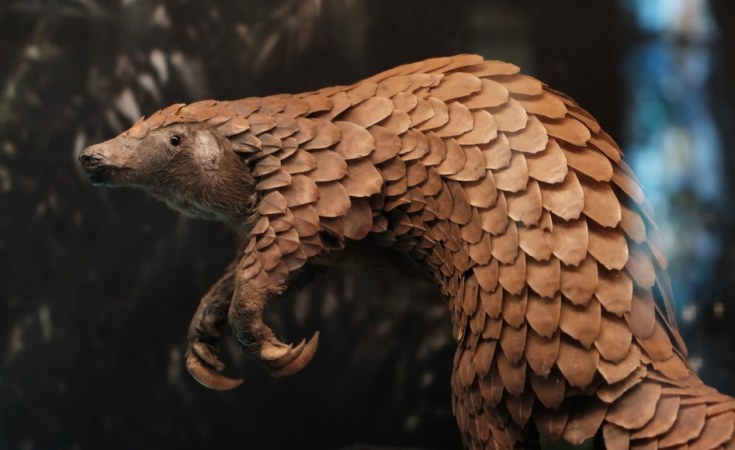Organised criminal networks that previously traded mostly with African elephant ivory are turning to pangolins.
Pangolins are the most trafficked mammals in the world, and Central Africa is emerging as a hotspot for these crimes. All four species of pangolin on the continent inhabit the forests of Central Africa and are classified as endangered or vulnerable.
Organised international criminal networks that previously traded mostly with African elephant ivory are turning to pangolins. Huge numbers are being trafficked to Asia, despite a 2017 global trade ban on all eight pangolin species, and domestic legislation in Central African countries to protect and manage endangered wildlife.
The transnational demand for pangolin products drives the continued poaching and illicit trade. The animal's meat is considered a delicacy in Asia. Its scales are thought to have magical and curative properties that drive demand for traditional medicine in Africa and Asia. Border porosity, weak law enforcement and corruption on the supply side enable this growing crime in Central Africa.
In 2021, Operation Kuluna, run jointly between the United States (US) and the Democratic Republic of the Congo (DRC) governments seized 938 kg of ivory and 34 kg of pangolin scales in Kinshasa worth around US$3.5 million. The two foreign nationals arrested for trafficking wildlife products had allegedly paid bribes to Kinshasa authorities to ship the commodities.
Huge numbers are trafficked to Asia, despite laws in Central African countries to protect endangered wildlife
A senior forestry official from the Republic of the Congo told the ENACT project that elephant and pangolin were the most poached species in the country. The forestry directorate says 20 tonnes of pangolin scales were seized at the port city of Pointe-Noire in 2018 and nine tonnes in 2020. Officials said these pangolins and their scales were smuggled from the port of Matadi in the DRC. Arrested traffickers over the years include Congolese, Malian, Lebanese and Chinese nationals.
According to the Last Great Ape Organisation (LAGA), wildlife crimes in Cameroon have increased in intensity and sophistication since the early 2000s and now include international illicit trade dimensions. LAGA is a non-governmental body that advocates for wildlife law enforcement in the country. Its Deputy Director Tah Eric Kaba told ENACT that pangolins are rapidly becoming extinct there.
At the source, locals form poaching cells to catch pangolins in their natural habitats. Criminal syndicates and buyers from cities such as Yaoundé and Douala buy the animals and their products from these cells. The cartels, which include Cameroonians and Nigerians, export the pangolins to Asia through major transit nodes such as Douala (Cameroon) and Lagos ports (Nigeria).
Cameroon has also emerged as a significant transit country for pangolins trafficked from the Central African Republic, says LAGA. Traffickers bribe border and customs officials to secure passage for illegal wildlife products and provide false customs declarations.
Huge numbers are trafficked to Asia, despite a 2017 international trade ban on all eight pangolin species
The primary destination markets include China, Thailand, Malaysia and Vietnam. A northern route through Chad and Sudan is used to traffic pangolins and other endangered animals to markets in Arab countries.
Pangolins, known as the guardians of the forest, protect local ecosystems from termite destruction. Their burrowing creates breeding habitats and shelter for other animals. Despite this, says Kaba, government officials generally perceive wildlife crime as low-level, resulting in poor responses compared to offences such as financial crime in the public sector.
It is imperative that the protection and conservation of this important mammal in Central Africa is prioritised. Officials in Cameroon, Gabon and the Republic of the Congo told ENACT that immediate solutions were needed in four areas: public awareness; increased funding for wildlife crime investigations; better collaboration among countries' law enforcement authorities; and capacity building.
Civil society organisations working in environmental conservation and protection can help ensure policymakers prioritise wildlife crime through advocacy and campaigns. A good example of how to reach wider audiences is a recent documentary, viewable on mobile devices, that shows pangolins as the most trafficked mammal.
Central African budgets for law enforcement and forest guards should reflect a commitment to stopping the trade
Allocating more funds for wildlife crime investigation and capacity building is vital to preventing and disrupting wildlife crime. Despite fiscal constraints, Central African governments' budgetary allocations to police, customs, forest guards and prosecution services should reflect their commitment to stopping the trade. Such funding could help them develop wildlife crime prevention strategies and collaborative local, national and cross-border interventions.
International development partners could also provide funding and training to design and implement anti-wildlife trafficking policies. In Malawi, the US Bureau of International Narcotics and Law Enforcement Affairs assisted local authorities in improving the capacity of investigators. This helped dismantle some of the continent's largest wildlife trafficking networks. The United Nations Office on Drugs and Crime has also collaborated with governments across Central Africa to develop Rapid Reference Guides for investigators and prosecutors of wildlife and forest crime.
Such multi-pronged initiatives can build the international commitment and cooperation required to stop wildlife trafficking. It could also debunk the myths surrounding the animals' medicinal properties, which would decrease demand.
Oluwole Ojewale, Regional Organised Crime Observatory Coordinator - Central Africa, ENACT, ISS
This article was first published by ENACT.


